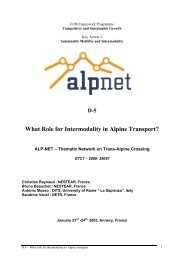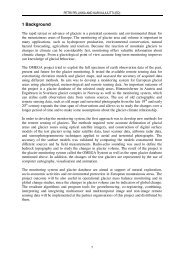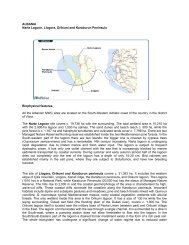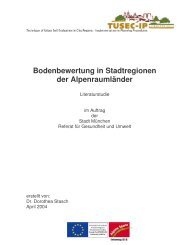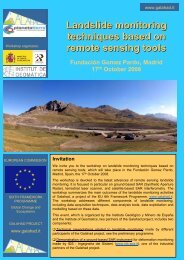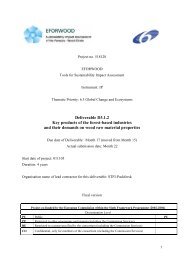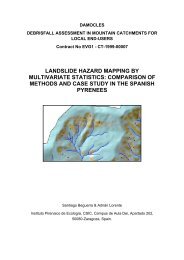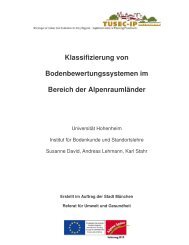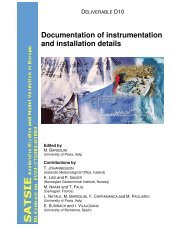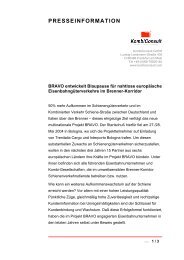Environmental Aspects of Sustainable Mobility - Transport Research ...
Environmental Aspects of Sustainable Mobility - Transport Research ...
Environmental Aspects of Sustainable Mobility - Transport Research ...
Create successful ePaper yourself
Turn your PDF publications into a flip-book with our unique Google optimized e-Paper software.
Within the constraints <strong>of</strong> existing technologies, it is also important to determine thepotential contributions <strong>of</strong> non-technological factors to the reducing environmental impacts.Examples include the contributions <strong>of</strong> traffic management (Brand et al, 2000), car sharingor car-pooling schemes (ICARO, 1999; Armandi and Stridi, 2002) and transfer to moreenvironmentally friendly modes (Brand et al, 2000; TRENDSETTER; Derek HaldenConsultancy, 2005). The potential impacts <strong>of</strong> improved operating and fuel managementpractices, including effective monitoring <strong>of</strong> fuel use, driver awareness, training andincentive schemes, and preventive maintenance also need to be investigated (DfT, 2003;REDUCE).The potential to utilise web-based information and other ICT technologies is potentiallyvast, and needs to be determined. Relevant applications include communication systemsand benchmarking tools for the provision <strong>of</strong> management information and evidence on bestpractice for reducing environmental damage (ECO, 1999), ICT systems for the provision <strong>of</strong>information on ship positioning and safe navigation (Maréchal, 2004; SPREEX, 2007),ICT-based reservation systems and payment processing to support car sharing schemes(Armandi and Stridi, 2002).In addition, there is a need to explore the links between transport environmental impactand land-use planning (TRANSPLUS, 2003; Gayda et al, 2005) and the potential impacts<strong>of</strong> increased levels <strong>of</strong> tele-working (COMMUTING, TELEWORKING AND TRANSPORT).4.3.3 <strong>Research</strong> resultsTechnology improvements and optimum technology choiceA great deal <strong>of</strong> research will need to be undertaken to produce technologicaladvancements which will ensure that environmental impacts resulting from the use <strong>of</strong>transport vehicles are minimised, both for conventional (internal combustion engine)vehicles and for vehicles powered by alternative systems in the future (FURORE, 2004).Engine and powertrain research will be needed to improve conventional technologies, butresearch investment in completely new technologies is also important to promotesustainable advances in environmental performance and energy security. The mainchallenge for electric vehicles is the development <strong>of</strong> cost effective advanced batteries /energy storage systems. For fuel cell and hydrogen based systems, improvements interms <strong>of</strong> production and distribution will make them a competitive alternative and thesustainability <strong>of</strong> fuel production must also be ensured. For all vehicles, vehicle weight hasimportant implications for both fuel consumption and safety, and in terms <strong>of</strong> vehiclemanufacturing there is a need for intensive research into new materials and productionprocesses including recycling technologies. <strong>Research</strong> into noise reduction needs toconcentrate on road/tyre interaction, engine noise and the exhaust and intake system.Thematic <strong>Research</strong> Summary: “<strong>Environmental</strong> <strong>Aspects</strong> <strong>of</strong> <strong>Sustainable</strong> <strong>Mobility</strong>” Page: 29 <strong>of</strong> 48<strong>Transport</strong> <strong>Research</strong> Knowledge Centre



